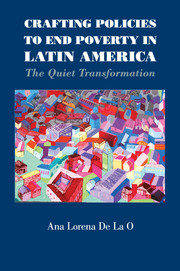Book contents
- Frontmatter
- Dedication
- Contents
- List of Figures
- List of Tables
- Acknowledgments
- 1 Introduction
- 2 The Universe of Cash Transfer Programs
- 3 Politics of Fighting Poverty
- 4 Explaining Policy Adoption and Design
- 5 Explaining Policy Outcomes
- 6 Conditional Cash Transfers and Clientelism
- 7 The Electoral Bonus of Conditional Cash Transfers
- 8 Conclusions
- Appendix
- References
- Index
2 - The Universe of Cash Transfer Programs
Published online by Cambridge University Press: 05 March 2015
- Frontmatter
- Dedication
- Contents
- List of Figures
- List of Tables
- Acknowledgments
- 1 Introduction
- 2 The Universe of Cash Transfer Programs
- 3 Politics of Fighting Poverty
- 4 Explaining Policy Adoption and Design
- 5 Explaining Policy Outcomes
- 6 Conditional Cash Transfers and Clientelism
- 7 The Electoral Bonus of Conditional Cash Transfers
- 8 Conclusions
- Appendix
- References
- Index
Summary
Social spending has been the object of great scrutiny in scholarly work. Yet central questions about how, when, and why governments use social spending to improve the lives of the poor remain unanswered. The first part of this chapter argues that to better understand the political conditions that lead governments in Latin America to redirect resources toward the poor, it is important to place social assistance disbursements into a separate category of social expenditure and to focus on program design and implementation, in addition to aggregate public expenditure. The chapter then introduces conditional cash transfer programs as social assistance policies deserving of scholarly attention. The last section of the chapter presents two indexes that capture the variation in the design and implementation of cash transfer programs across countries and over time in Latin America.
ON THE RELEVANCE OF THE DESIGN OF ANTIPOVERTY PROGRAMS
Aggregate statistical measures such as social expenditure per capita paint a picture of stability across middle-income countries in Latin America. However, this characterization masks the myriad of social policy reforms that have taken place across the region in recent decades. Aggregate measures do not reveal, for example, the profound transformation in pension systems from public risk-pooling systems to individual market-based designs in many countries in Latin America (Brooks 2009), nor do they capture the more recent surge of noncontributory pensions targeted to poor households (Carnes and Mares 2009).
In addition to masking social policy reforms, expenditure per capita and other widely used aggregate measures conflate broad spending concepts that are not all directly related to social policy. For example, many definitions of aggregate social spending include expenditures on social protection, social assistance, health, and education, but also include expenditures on infrastructure, rule of law, and defense. Therefore, although aggregate social spending may reveal the size of a state, it does not offer much insight into the amount of resources that a country allocates to directly address poverty or the extent of redistribution that takes place.
- Type
- Chapter
- Information
- Crafting Policies to End Poverty in Latin AmericaThe Quiet Transformation, pp. 24 - 43Publisher: Cambridge University PressPrint publication year: 2015
- 1
- Cited by

